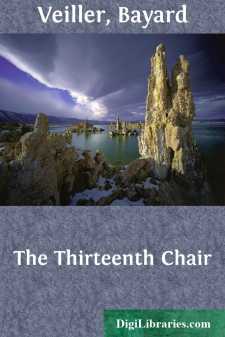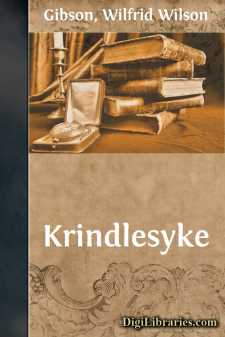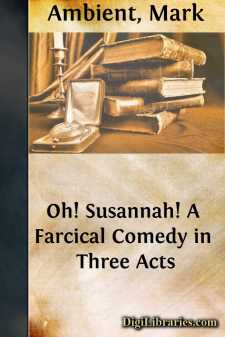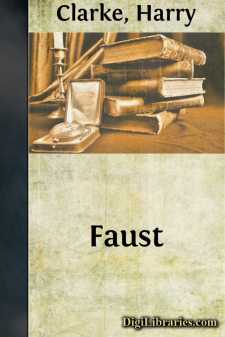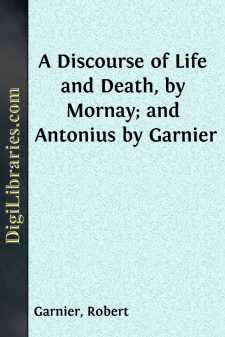Drama
General Books
Sort by:
by:
Bayard Veiller
ACT I The SCENE is the Italian Room in ROSCOE CROSBY'S Home in New York. It is a handsome room. A plan of the setting will be found at the end of the play. As the curtain rises Miss HELEN O'NEILL and WILLIAM CROSBY are discovered standing R.C. They are in each other's arms, and the rising curtain discloses them as they kiss. The window blinds are drawn. HELEN. I love you so. WILLIAM. You...
more...
BOOK I PHŒBE BARRASFORD Krindlesyke is a remote shepherd’s cottage on the Northumbrian fells, at least three miles from any other habitation. It consists of two rooms, a but and a ben. Ezra Barrasford, an old herd, blind and decrepit, sits in an armchair in the but, or living-room, near the open door, on a mild afternoon in April. Eliza Barrasford, his wife, is busy, making griddle-cakes over the...
more...
by:
Eugene Walter
EUGENE WALTER (Born, Cleveland, Ohio, November 27, 1874) When questioned once regarding "The Easiest Way," Mr. Eugene Walter said, "Incidentally, I do not think much of it. To my mind a good play must have a tremendous uplift in thought and purpose. 'The Easiest Way' has none of this. There is not a character in the play really worth while, with the exception of the old agent. The...
more...
At rise, is seen the entrance to a tent, out of which steps an animal-tamer, with long, black curls, dressed in a white cravat, a vermilion dress-coat, white trowsers and white top-boots. He carries in his left hand a dog-whip and in his right a loaded revolver, and enters to the sound of cymbals and kettle-drums.) Walk in! Walk in to the menagery,Proud gentlemen and ladies lively and merry!With avid...
more...
by:
Mark Ambient
ACT I. Scene. The Doctor's consulting room. Ground floor, 13 Marmalade Street, Pimlico. (See Scene Plot.) (Aurora. the slavey, discovered laying out Doctor's letters lovingly on his writing table; she kisses each one as she lays it down—all are in blue envelopes.) Aurora. They're all for 'im—the dear doctor. Won't 'e be pleased when 'e comes back and finds all...
more...
by:
Harry Clarke
I Erhabener Geist, im Geisterreich verloren! Wo immer Deine lichte Wohnung sey,Zum höh'ren Schaffen bist Du neugeboren,Und singest dort die voll're Litanei.Von jenem Streben das Du auserkoren,Vom reinsten Aether, drin Du athmest frei,O neige Dich zu gnädigem ErwiedernDes letzten Wiederhalls von Deinen Liedern! II Den alten Musen die bestäubten KronenNahmst Du, zu neuem Glanz, mit kühner...
more...
by:
Eugene O'Neill
SCENE I SCENE—The firemen's forecastle of a transatlantic liner an hour after sailing from New York for the voyage across. Tiers of narrow, steel bunks, three deep, on all sides. An entrance in rear. Benches on the floor before the bunks. The room is crowded with men, shouting, cursing, laughing, singing—a confused, inchoate uproar swelling into a sort of unity, a meaning—the bewildered,...
more...
by:
Robert Garnier
Sieur du Pleßis Marly. T seemes to mee strange, and a thing much to be marueiled, that the laborer to repose himselfe hasteneth as it were the course of the Sunne: that the Mariner rowes with all force to attayne the porte, and with a ioyfull crye salutes the descryed land: that the traueiler is neuer quiet nor content till he be at the ende of his voyage: and that wee in the meane while tied in this...
more...
by:
Edward Young
ACT THE FIRST. SCENE I.BATTLEMENTS, WITH A SEA PROSPECT. Enter Zanga. Zan.Whether first nature, or long want of peace,Has wrought my mind to this, I cannot tell;But horrors now are not displeasing to me:[thunder.I like this rocking of the battlements.Rage on, ye winds; burst, clouds; and, waters, roar!You bear a just resemblance of my fortune,And suit the gloomy habit of my soul.Enter...
more...
by:
Bernard Shaw
Where Heartbreak House Stands Heartbreak House is not merely the name of the play which follows this preface. It is cultured, leisured Europe before the war. When the play was begun not a shot had been fired; and only the professional diplomatists and the very few amateurs whose hobby is foreign policy even knew that the guns were loaded. A Russian playwright, Tchekov, had produced four fascinating...
more...


